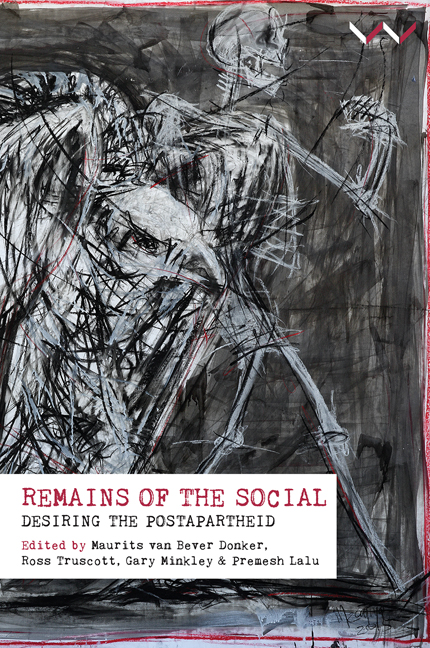Book contents
- Frontmatter
- Contents
- Acknowledgements
- Preface
- Chapter 1 Traversing the Social
- Chapter 2 The Mandela Imaginary: Reflections on Post-Reconciliation Libidinal Economy
- Chapter 3 The Return of Empathy: Postapartheid Fellow Feeling
- Chapter 4 The Ethics of Precarity: Judith Butler's Reluctant Universalism
- Chapter 5 Hannah Arendt's Work of Mourning: The Politics of Loss, ‘the Rise of the Social’ and the Ends of Apartheid
- Chapter 6 Souvenir
- Chapter 7 Re-Cover: Afrikaans Rock, Apartheid's Children and the Work of the Cover
- Chapter 8 The Graves of Dimbaza: Temporal Remains
- Chapter 9 The Principle of Insufficiency: Ethics and Community at the Edge of the Social
- Chapter 10 The Trojan Horse and the ‘Becoming Technical of the Human’
- About the Contributors
- List of Figures
- Index
Chapter 10 - The Trojan Horse and the ‘Becoming Technical of the Human’
Published online by Cambridge University Press: 21 April 2018
- Frontmatter
- Contents
- Acknowledgements
- Preface
- Chapter 1 Traversing the Social
- Chapter 2 The Mandela Imaginary: Reflections on Post-Reconciliation Libidinal Economy
- Chapter 3 The Return of Empathy: Postapartheid Fellow Feeling
- Chapter 4 The Ethics of Precarity: Judith Butler's Reluctant Universalism
- Chapter 5 Hannah Arendt's Work of Mourning: The Politics of Loss, ‘the Rise of the Social’ and the Ends of Apartheid
- Chapter 6 Souvenir
- Chapter 7 Re-Cover: Afrikaans Rock, Apartheid's Children and the Work of the Cover
- Chapter 8 The Graves of Dimbaza: Temporal Remains
- Chapter 9 The Principle of Insufficiency: Ethics and Community at the Edge of the Social
- Chapter 10 The Trojan Horse and the ‘Becoming Technical of the Human’
- About the Contributors
- List of Figures
- Index
Summary
The pursuit of learning is to increase day after day
The pursuit of Tao is to decrease day after day
It is to decrease and further decrease
Until one reaches the point of taking no action
No action is undertaken,
And yet nothing is left undone
(Little, The Warrior Within 117).Given all that has been written and done in memory of the student movements in South Africa, it is surprising that we have not had an adequate account of the drives and desires that animated an unprecedented movement of school students over a period of six months in 1985. In an effort to address the omission, the historian Colin Bundy argues that the students were driven by a sense of ‘immediatism’ expressed in what he charmingly calls a combination of street sociology and pavement politics. The resort to charm, however, encounters its limit in the political calculation surrounding what came to be known as the Trojan Horse Massacre in which three students were killed in Athlone, Cape Town, on 15 October 1985, and in a similar event staged by the state the following day in nearby Crossroads where two young people died.
In several scholarly works and documentary films, not to mention memorials, poems and works of art, the Trojan Horse incident has lent itself to ideological prescription rather than attentiveness to what was at work in the student movement that triggered the state killings in 1985. As a result, we have an event that is returned again and again to the realms of ideology or is memorialised in a way that re-enacts a habituated memory of attachment to war and violence – as if these were the only games in town to play.
The scene of the Trojan Horse incident, and the prehistory of that tragic occurrence, are what preoccupied the Cape Town writer Richard Rive in his novel Emergency Continued (1990). The intensity of Rive's novel has recently been recalled by Adam Sitze in his essay titled ‘Between Study and Revolt: Further Notes on Emergency Continued’. Sitze nudges the reader to ask what we are to do with the idea of ‘school’ – and scholē – which seems to have been a specific site of both indecision and intensification under the conditions of the permanent emergency of apartheid.
- Type
- Chapter
- Information
- Remains of the SocialDesiring the Postapartheid, pp. 249 - 274Publisher: Wits University PressPrint publication year: 2017



